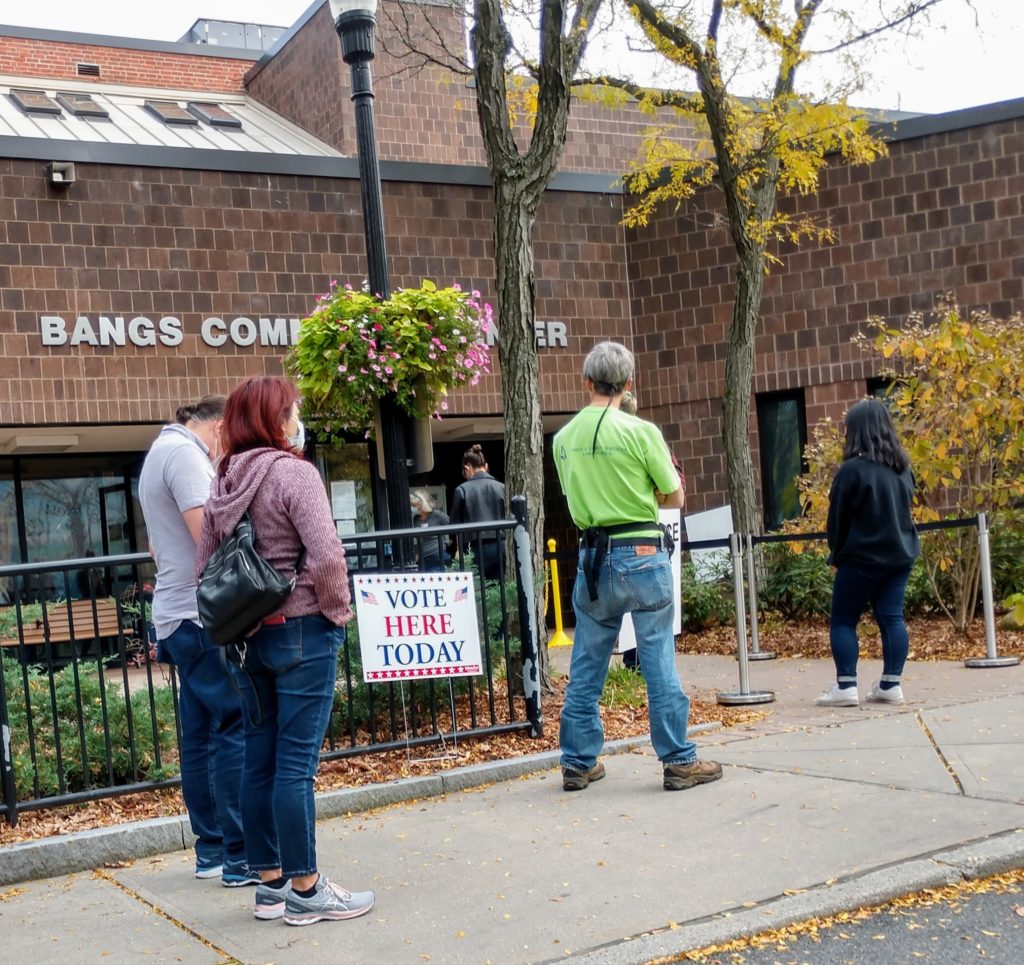Opinion: The Odd Thing About Amherst’s Elections

Early voting at the Bangs Center on Tuesday October 20., 2020. Photo: Janet Keller
”It’s an exciting time for Amherst politics. On Tuesday, the town will elect a new slate of town councilors, school committee members and Jones Library Trustees. That said, election day should be next year.
Section 7.1 of the Home Rule Charter establishes that town election days fall on each odd-numbered year — staggering town elections from national and state cycles. The conventional rationale for these “off-year” elections is that they insulate local politics from federal and state politics.
But just looking at voter turnout data from the Town Clerk, something’s clearly wrong.
In the 2022 statewide elections, the average turnout across Amherst’s voting precincts was 56.26%. For the previous year’s town election, voters turned out at a rate of just 31.15%.
One immediate reason for this discrepancy? Voters can’t be bothered. Between congressional midterms, presidential races, primaries, and state elections — Americans are perpetually in election season. But by following this schedule, Amherst falls victim to a pernicious failure of local democracy.
Studies show that certain demographics are under-represented in off-year elections. The time and resources required to vote can be prohibitive for many voters; a local election you know little about makes justification even harder. But older, white, upper-class voters are more often able to overcome these electoral barriers. Those over 65, particularly, are over 15 times more likely to vote in municipal elections than voters between 18 and 34. As a result, councilors elected with our off-year schedule are likely to be unrepresentative and hold different policy preferences than the median voter.
Off-year schedules are also an easy target for interest groups and political committees. In low-turnout elections, highly motivated groups can organize to overwhelm the meager voting population and sway results. UC Berkeley professor Sarah Anzia found that municipalities with active police unions are less likely to adopt body cameras, and, specifically in off-year elections, districts with dominant teachers’ unions pay experienced teachers more. Regardless of the specific policy, low-turnout elections are producing town governments more responsive to the priorities of political committees than the general electorate.
Beyond the psychological load of making voters invest in politics for another election, off-year schedules bring a real financial burden on the town.
Election administration is costing Amherst thousands of dollars: Between 2020 and 2023, the Town Council appropriated an average of $59,880 per year for elections and registrations. Consolidating elections would dramatically reduce costs and administrative strain.
Even year elections create a more representative government, strengthen democracy, and cut costs. Next year, per section 9.6, a committee will be formed to consider amendments to the Home Rule Charter. I urge the Councilors elected on Tuesday and residents on this committee to push for even-year elections.
Julius Tyson is a student at Amherst College.

That change is number 1 on my Home Rule Charter amendment preference list! I can’t figure out why the Commission would have put elections in the years with low voter turn out, unless it was because, as you say, “low-turnout elections are producing town governments more responsive to the priorities of political committees than the general electorate”.
The Charter Commission was advised that Massachusetts law does not permit a municipality to hold municipal elections on the same day as a state election. In fact, in order to hold the first Council election in September and November 2018 on the same days as the state primary and general election, the Town had to file for a special act, which needed passed by the Massachusetts Senate and House and signed by the governor (https://malegislature.gov/Laws/SessionLaws/Acts/2018/Chapter118). If the Charter Commission could have put the regular municipal elections on the same date as state elections in even years in November, it would have. But, it was not a legal option. I encourage all to ask our state legislators to change the state law. If done, I suspect many municipalities would move to even year, November elections – for the reasons stated above – increasing voter turnout and decreasing municipal election costs.
Could Amherst just have a special act to hold them during regular elections? This odd year calendar really cuts students-60-70% of our population–out of our town elections.